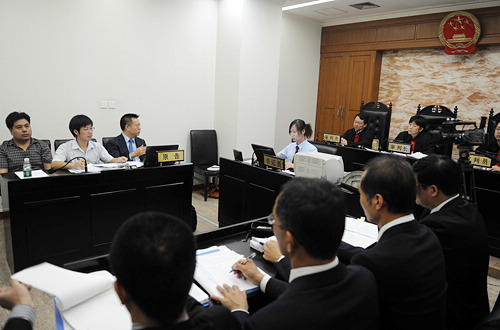|
 |
|
PROCEDURAL JUSTICE: A civil lawsuit being heard at the Beijing No.2 Intermediate People's Court on September 6 (GONG LEI) |
The long-awaited amendment of China's Civil Procedure Law has taken a crucial step. On October 28, the Standing Committee of the National People's Congress (NPC), China's top legislature, reviewed a draft amendment to the law for the first time.
"With the rapid development of China's economy and the country's increasingly complex legal system, more civil and commercial disputes have arisen in recent years and aggrieved parties are increasingly willing to go to the courts to resolve their disputes," said Wang Shengming, Deputy Director of the Legislative Affairs Commission of the NPC Standing Committee.
But, according to Wang, the current law is no longer able to cope with China's socio-economic realities.
The current Civil Procedure Law took effect in 1991. In 2007, minor revisions were made, which mainly focused on problems in enforcement and retrial procedures.
"The ongoing amendment will pay greater attention to guaranteeing the rights of litigants, enhancing legal supervision and improving implementation procedures," Wang said.
In June, two drilling platforms of an offshore oilfield operated by ConocoPhillips China, a subsidiary of U.S. energy giant ConocoPhillips, were found to have leaked oil into the Bohai Gulf. According to a November 12 statement of the State Oceanic Administration of China, the oil spill polluted 6,200 square km of the Bohai Sea, an area roughly nine times the size of Singapore.
After the accident, some individual Chinese citizens and environmental organizations tried to sue ConocoPhillips China for environmental damage, but their requests were turned down by courts.
Legal experts attributed the rejection to the current Civil Procedure Law's failure to empower authorities, individuals and civil organizations to file lawsuits against those who violate the public interest.
Under the current law, only government agencies and people directly affected by an incident are allowed to sue over environmental pollution and food safety, which has prevented many cases from being filed.
"When pollution occurs in some place, we can do little to hold the polluters accountable because we are not recognized by the law as plaintiffs," said Ma Yong, a worker at the Environmental Law Center of the All-China Environment Federation, a non-governmental environmental organization in Beijing.
The draft amendment that is being reviewed proposes to allow related authorities and civil organizations to represent the public and file lawsuits concerning violations of public interests, such as environmental pollution and consumer rights infringement.
During the NPC Standing Committee's review of the draft amendment, many legislators called for a specific definition of the related authorities that are entitled to initiate class actions.
Ren Maodong, a member of the NPC Standing Committee, said that departments of administration are often reluctant plaintiffs in class actions, as many incidents occur as a result of their neglect of duty. In other cases, local and departmental protectionism prevent authorities involved from playing their due role.
In the case of the Bohai Sea oil spill, the State Oceanic Administration is expected to file litigations against ConocoPhillips China on behalf of the state under the Marine Environment Protection Law of China. The SOA declared that it would sue for ecological compensation. However, the proceedings haven't started five months after the accident and the administration has failed to provide an explanation.
Meanwhile, some legal experts believe that the "related authorities" should also include departments of prosecution, given that policy guidance is also one of their functions.
According to the draft amendment, civil organizations are considered as qualified plaintiffs to file class suits. Ma explained that class suits are often difficult for a single litigant to sustain, as the cases are usually long and drawn out and require multiple court appearances. Comparatively, civil organizations possess more ample financial and technical resources, as well as a greater capacity to collect, preserve and make use of evidence, which makes them better plaintiffs.
Recently, local judicial authorities in Guizhou, Yunnan, Hainan, Shandong and Jiangsu provinces established special courts in succession to deal with environmental lawsuits. Also, some localities have issued regulations to allow civil organizations to file public interest litigation.
The All-China Environment Federation, for example, has taken polluters to environment courts in Guiyang in Guizhou and Wuxi in Jiangsu and won the lawsuits.
Some legislators also suggest that ordinary citizens whose interests are not directly related to the case could also be plaintiffs in class suits, saying it would boost citizens' participation in public affairs.
However, Chang Cheng, a program officer from Friends of Nature, another non-governmental environmental organization based in Beijing, said government support is vital for the success of class suits, especially those involving environmental pollution.
| 